MALTA: Matrimony, Adultery, Luminous Mysteries, and St George Preca
I recently had the pleasure of interviewing Father Donald Calloway {listen to the our Champions of the Rosary interview} on the history of the Rosary and he taught me something that I did not know:
The 5 Luminous Mysteries do not find their origin with Saint John Paul II in 2002 with is Apostolic Letter Rosarium Virginis Mariae, but rather with Saint George Preca in the 1950s.
In 1950s, Saint George Preca prayerfully discerned that the Church needed to focus on the public and sacramental ministry of Christ within the context of the Holy Rosary. He began praying a set of 5 new mysteries in the context of the Rosary, which he called “Mysteries of Light.” These were published by him in a leaflet in 1973.

Saint George Preca was canonized by Pope Benedict XVI on June 3, 2007.
There’s a historical twist to this story. Saint George Preca was a priest of the island of Malta!
You may have heard that the two bishops of the island of Malta have ruled that the divorced and remarried that have not received annulments and continue to live in a sexual relationship can receive the Holy Eucharist after a period of discernment and following their conscience in the pursuit of peace. The debate centers of baptism, matrimony, the teaching of Christ, and the Eucharist (4 of the 5 Luminous Mysteries). There has also been some confusion about the Knights of Malta with regard to the distribution of contraceptive devices. Why Malta?
Could it be that Jesus and Mary’s Luminous Mysteries AND the presence at the “Wedding at Cana” was especially planted on the island of Malta by Christ through his sainted priest George Preca?
All the Luminous Mysteries speak to our time and our personal difficulties:
- Jesus’ Baptism in the River Jordan
- His manifestation at the wedding at Cana
- His proclamation of the Kingdom of God, with his call to conversion
- His transfiguration before the Apostles on Mount Tabor
- His institution of the Eucharist
These are profound meditations for our current vocation within the Catholic Church to become saints:
- Baptism: Our baptismal dignity and call to be holy as He is holy.
- Matrimony: Our call to transform water into wine: to transform the natural creation ordinance of matrimony into a supernatural grace-filled union of sanctity. And to sanctify family life in the context of matrimony.
- The perfect teaching of Christ: Evangelizing our hearts and inviting others by turning the Truth of Christ as preserved by His Catholic Church.
- Transfiguration: Stress on the Divinity of Christ and His power in our lives to transform us.
- Eucharist: The sacrosanct nature of the Eucharist, because the Eucharist is Christ Himself.
I have no doubt that Our Lady desires for us to come to Jesus Christ by meditating on these Mysteries of Light. As Father Calloway says, new battles require us to renew our weapons. The Rosary has been modified over time (listen to the interview to learn more) and it seems that two saints for our time: Pope Saint John Paul II and the Maltese Saint George Preca may have been guided by Heaven to guide our prayers during this time of Darkness with Mysteries of Light.
Post tenebras lux,
Taylor Marshall, PhD
PS: On the island of Malta, a viper bit Saint Paul. But he remained uninjured as by a miracle. The fangs of the serpent did the Apostle no harm:
After we had escaped, we then learned that the island was called Malta. 2 And the natives showed us unusual kindness, for they kindled a fire and welcomed us all, because it had begun to rain and was cold. 3 Paul had gathered a bundle of sticks and put them on the fire, when a viper came out because of the heat and fastened on his hand. 4 When the natives saw the creature hanging from his hand, they said to one another, “No doubt this man is a murderer. Though he has escaped from the sea, justice has not allowed him to live.” 5 He, however, shook off the creature into the fire and suffered no harm. 6 They waited, expecting him to swell up or suddenly fall down dead; but when they had waited a long time and saw no misfortune come to him, they changed their minds and said that he was a god. (Acts 28)
Share this post on Facebook by clicking here.
Dive Deeper

GET CONFIDENT IN YOUR FAITH
Explore the fascinating world of Catholic teachings with Dr. Marshall. Together you’ll unpack the brilliant answers the Church gives to tough questions about the Faith. The best part: you go at your own pace. Start this exciting journey today.

